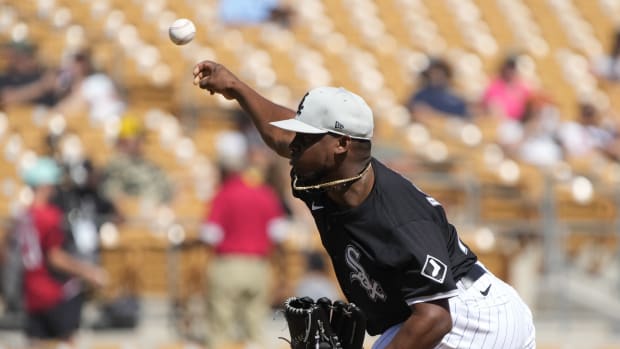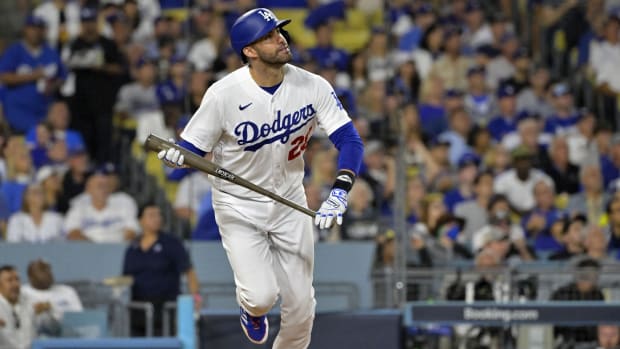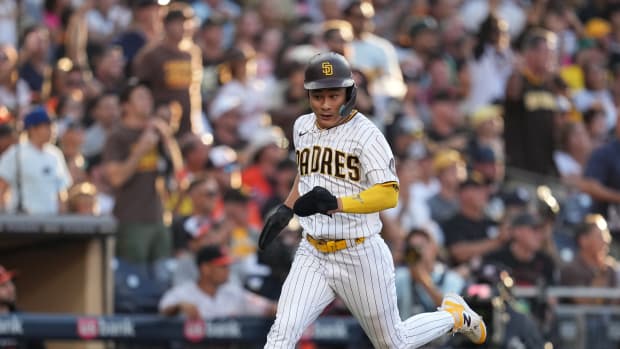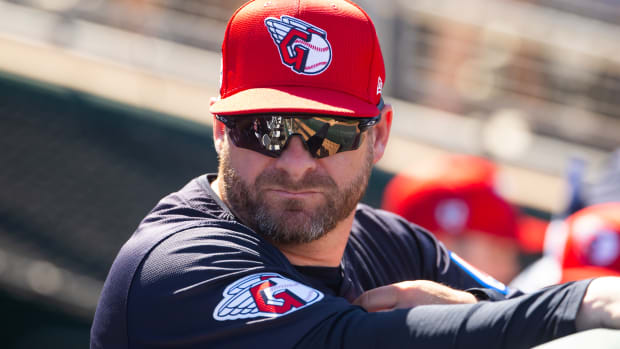Astros' Cheating Haunts Clayton Kershaw's Memory of 2017 World Series
GLENDALE, Ariz. — Playing a World Series game at Minute Maid Park against the Astros is not the most dangerous game a pitcher can play. The most dangerous game to play is the game of “What if?”
Clayton Kershaw wants no part of it. Mostly.
“The only thing that bothers me is the real-time stuff,” Kershaw told SI about how Houston misused technology to steal signs, including making him the highest-profile victim of what went down at Minute Maid Park in 2017. “I’m sure a lot of teams were going up to that line, but once [Houston] started doing it in real time and using technology in real time, that’s what separates it.
“I’m sick of people saying that everybody was the same, that everybody was doing it. No. We weren’t all doing that. That was separated from everybody else.”
The Astros’ sign-stealing scandal is baseball poison that spreads its toxicity far and wide. Every ill-gotten advantage Houston stole heaped a disadvantage upon unsuspecting opponents. Pitchers such as Mike Bolsinger and Kris Medlen saw their careers wither to nothing after pitching at Minute Maid Park. Others such as David Robertson now wonder whether a bad outing there was because the hitters knew what was coming. Games, salaries, service time, playoff series, championships all were infected.
Astros’ hitters are not immune, either. Marwin González parlayed his trash-can-assisted 2017 season into $21 million from the Twins and has never hit like that before or since. Two front office executives this week pointed out to me that the formerly free-swinging George Springer cut his strikeout rate from 26 percent to 19 percent since 2017, and who exactly is he on the free-agent market?
But in this vast universe of the affected, none absorbed a greater historical hit from what the Astros did than Kershaw, the ace of the Los Angeles Dodgers and the greatest pitcher of his generation.
Kershaw took the mound for Game 5 of the 2017 World Series with the series tied at two. He had pitched an absolute gem in winning Game 1, joining Don Newcombe from 1949 as the only pitchers to strike out 11 batters without a walk in a World Series game.
By the fourth inning of Game 5, Kershaw had not allowed a base runner and held a 4-0 lead. To that point in his career he was 105-7 when the Dodgers gave him four runs, and 71-1 when they gave him a four-run lead.
On path to a second win in the series and with an ERA of 0.90, Kershaw was the presumptive World Series Most Valuable Player. And with this win all the demons about Kershaw's not winning the big game (he was 7-7 lifetime in the postseason) would be vanquished for good.
And then he was poisoned. Houston hung six runs on Kershaw, knocking him from the game in the fifth inning. He lost leads of 4-0 and 7-4. The Astros would win one of the wildest World Series games ever played, 13-12, and go on to win the series.
We know Houston altered history by cheating. We don’t know the exact pitches in which a Houston batter knew what pitch was coming. But we do know through the investigation by the commissioner’s office that they cheated “throughout the 2017 postseason.” And now we know they used the trash-can scheme during the postseason, because commissioner Rob Manfred revealed it this week, refuting a claim by the Astros that they had moved on from the system by then.
Asking Kershaw about that night was like asking someone about the time they had their wisdom teeth removed. He wanted no part of reliving the pain, especially knowing what all us know now.
“What did you think that night about that game?” I asked him.
“That didn’t come to my mind,” he said, referring to the Astros knowing what he was throwing.
“What did?”
“I just pitched poorly. Lost the game.”
“That was it?”
“Yeah.”
“But you were dealing the first three innings.”
“I don’t have the luxury of looking at it like that, like everybody else does.”
“So your thought was just that you didn’t pitch well?”
“It was a long time ago. I knew we had to fly back to L.A., so I was probably more worried about getting my kids on a plane at that point.”
“But if you look at the breakdown of that game, you threw 39 sliders and got only one swing and miss. The last two batters drew walks on 3-and-2 sliders they spit on.”
“I’m not going there. This interview is not going there. I’m not going there.”
“Can you explain why you don’t want to go there?”
“I can’t. It’s over.”
But later Kershaw did reveal one critical insight about that game, the swing game in that series if not his career. When discussing the accepted means of stealing signs in baseball–a runner on second base can glean the signs from a careless catcher, for instance–Kershaw revealed what only in hindsight stands as a major breach in aiding the enemy.
“If you don’t change your signs up every few pitches with a guy on second base, it’s on you,” he said. “I just don’t want to have multiple signs with a guy on first base, you know? That slows the game down. Slows the rhythm down.
“And I didn’t do that in Houston. I used one sign. And I should have known. They were using multiple signs all the time.”
“In 2017 the Astros were using multiple signs even without a runner at second?”
“Yes. I just didn’t do it.”
Then, explaining his reasoning, Kershaw said, “To me, it’s like, ‘Well, I’m not tipping my pitches, I give one sign, and they shouldn’t be able to know what’s coming because they’re not getting it from the catcher and they’re not getting it from me.’ They shouldn’t know. And that’s probably just me being naive as well about how they can use technology.”
Kershaw was playing by an old honor code in a den of thieves. It was the equivalent of using “password” as your password while at a hackers’ convention. But who knew? Who would suspect anyone of stealing and relaying signs in real time at the World Series? The Astros, that’s who.
Something very telling went unnoticed in that game, especially by the Dodgers, only two batters into the game. Chris Taylor led off for Los Angeles with a single. As Houston starter Dallas Keuchel went into the stretch, catcher Brian McCann gave multiple signs—with a runner at first base. The Astros were using the majors’ top security system. Why? Because they knew how to breach those of others.
Kershaw took no such defensive measures with his catcher, Austin Barnes. With the bases empty and with a runner on first base, Kershaw and Barnes used time-worn signals straight from the schoolyard: one for fastball, two for curve, three for slider. Barnes sometimes added location for in or out.
“He was rolling,” Dodgers manager Dave Roberts said that night about Kershaw. “He was throwing the ball well. Good rhythm.”
Kershaw began the fourth inning by missing with a fastball far inside to Springer. He retired Alex Bregman on a fly ball to left, but it took six pitches to do so, the last one a slider out of the zone that Bregman hit weakly.
The rally took wing when José Altuve hooked a 2-and-2 high slider for a single. Now Houston had runners at first and second. Facing Carlos Correa, Kershaw looked for the sign from Barnes, but both seemed to realize they were not in sync on what signs to use. Thirteen batters into the game, this was the first time they went to multiple signs because it was the first time a runner reached second base. Kershaw called time, and the pitcher and catcher conferred.
The first sign was for an inside fastball. The pitch was off the plate, but Correa sold out for it and pulled it foul. Barnes then called for the same pitch, using what now seems a rudimentary sequence: fastball-slider-fastball. This fastball, too, was so far in it was off the plate—a ball—but again Correa sold out and this time pulled it for an RBI double. He replaced Springer as the runner at second base.
Kershaw chose a slider to start the next batter, Yuri Gurriel. It caught too much of the plate with too much height. Gurriel slammed it to leftfield for a game-tying homer. Kershaw slumped on the mound as if he had just been punched in the gut.
That night Kershaw explained what happened that inning this way: “I just lost my command a little bit there in the fourth inning, and that’s all it took. I know it was a slider, but it must have stayed up because he put a really good swing on it.”
In the fifth, Kershaw took care of Gonzalez and McCann for the first two outs. But he walked Springer again, this time on a 3-and-2 slider that was over the plate but low. The next batter, Bregman, bled Kershaw for 10 pitches before he, too, spit on a full count slider, though that one Kershaw overthrew and drove into the dirt.
One theme through the fourth and fifth inning became obvious: Kershaw’s inability to generate swings and misses, especially inside against righthanded hitters. Correa, Springer and Bregman kept hammering hits or fouls every time Kershaw tried to get in on their hands. Kershaw had thrown 94 pitches to 20 batters. Roberts could not risk pushing him any further.
Kershaw left with more walks (three) than strikeouts (two) for the first time since 2010 and his fewest swings and misses (four) since 2012. The Astros slugged .562 at Minute Maid Park in the series, and .396 at Dodger Stadium.
Kenta Maeda replaced Kershaw to throw his late-biting slider to Altuve. Maeda did so six straight times but couldn’t put away Altuve. So Maeda and Barnes decided to throw a fastball. Maeda threw it down the middle. Altuve crushed it for a game-tying homer.
Kershaw sat in the dugout with his hat off, hair askew and head drooping, a sad picture of fatigue and frustration. There would be no win. No MVP. No demons vanquished. After the game he would have to answer yet again why a big game had gone so poorly for him.
In the past week some of baseball’s biggest stars have shredded the Astros for what they’ve done, including Mike Trout, Aaron Judge, Giancarlo Stanton and Cody Bellinger. Many have crossed their own union, which did well in its sworn duty to protect its players by letting Manfred know immediately he had no established mechanism to punish them. Protocols be damned, these players are so angry they want the Astros players punished.
With the highest-profile defeat at Minute Maid Park that year, Kershaw is angry but restrained in processing what happened. He was astute in explaining why the “everybody was doing it” defense does not provide even a fig leaf for the Astros. Players are enraged not because the Astros cheated but because of the extraordinary lengths to which they cheated.
“Now I can’t speak to what everybody else was doing and I’m sure a lot of teams were going up to that line as far as how to use technology, but nobody was seeing it on TV and relaying it in real time,” Kershaw said.
That four-second window of thievery between when the sign is flashed and when the pitch is thrown is the felony compared with the misdemeanor of using video to decode sign sequencing with a runner at second.
“You still have to get a guy on second base, you still have to see the signs from second base and you still have to relay them,” Kershaw said. “There’s a skill involved in that. It’s not as easy as people say it is.
“Most people understand [the difference]. I just think it was unprecedented. I don’t think anybody had seen cheating to that degree before. I’m not sure if anybody knew how to process what happened, so everybody is going to speak out in their own way. And some people are just disappointed that the game got to that point. And some people are just mad, visibly mad. And I think all those emotions are O.K.
“The important thing is I hope this doesn’t take away from how great our game is. I think a lot of people are focusing on the scandal and rightfully so. And I get that. But it’s still a great game. There’s still some great players that are really fun to watch. And to the kids at home that are hearing all this stuff, it’s done with. It’s not going to happen anymore. It’s not going to happen in 2020, regardless of what new rules are in place. It’s not going to happen again. This year will be fun.”
If other teams are going to crunch algorithms to figure out his signs, in the manner that Houston’s back-office quants did in Operation Codebreaker, Kershaw has a message for them: knock yourselves out.
“Once again, I might be in the minority on this,” he said. “I don’t care. I really don’t. That guy can sit up there all day long and know every algorithm for every sign. Just change your signs. They can’t know in real time. Unless they get it in real time. They can’t know. I don’t care if they know every sequence I’ve used for the last 30 years. It doesn’t matter. Just change it.
“It’s going to take 47 minutes now to get the sign with a guy on second base, and that’s tough because there’s not going to be guys on the same page. Just don’t let anybody on second base, either. It only should happen once or twice a game if you’re pitching well.”
Kershaw brings an important voice to what’s been a discordant chorus in response to what the Astros did and how they were punished. From the caustic to the cynical to the conspiracy theorists, players have argued for everything from taking the title away to threatening physical harm to Astros.
I’ve been astonished how many smart, level-headed players, managers and front office executives I’ve spoken with who still believe the Astros wore buzzers during the 2019 postseason. There are no facts supporting such a belief. All the facts are on the side of no buzzers: players testifying under immunity that it didn’t happen, no such evidence found in the investigation, strong denials by Correa, Springer and Altuve, etc.
But the belief persists. I’ve heard many versions of the conspiracy, among them: They wore buzzers in their shoes or buzzers on their bums or rigged vibrations from force plates embedded on the back wall of the dugout. These are otherwise smart baseball people. To maintain such a belief is to maintain that the players and team employees all told the truth about 2017 but lied about 2019 and/or that MLB covered up rogue behavior in 2019 and the people who told them about it are complicit. That’s how badly people think of the Astros.
I appreciate Kershaw’s voice of reason on this one. And his voice is important not only because of what happened in 2017 Game 5 but also because of his stature in the game. He is a three-time Cy Young Award winner and future first-ballot Hall of Famer who won the Roberto Clemente Award for his humanitarian efforts when he was just 24 years old.
“I’ve heard a lot of people conjecture about that and talk about that,” Kershaw said about buzzers. “I almost don’t want to believe it. And you know what? Not that they deserve the benefit of the doubt, but unless something comes to light, I’m just not going to believe it. I’m just not. Until I hear something.
“If that never comes and I never know I’m going to be able to sleep at night. It’s O.K. And if they did it in ‘19 and still lost the World Series, that’s impressive. Really, really impressive.
“If there’s factual evidence and it comes out, then I think everybody has to rethink their punishment at that point. But for now, it is what is, players got immunity so we got all the information [and] the punishments came out. I’m sure at the time the commissioner’s office thought it was one of the harsher penalties of all time, and it was. A lot of people are upset. Rightfully so. And I’m just happy that it’s not going to happen again.”


































